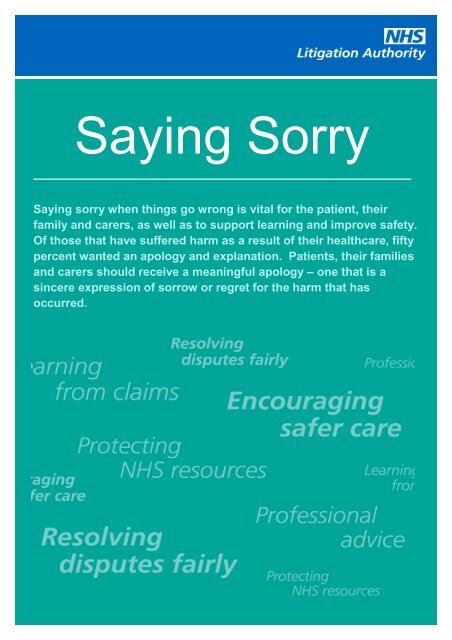Saying Sorry - Leaflet
Saying Sorry - Leaflet
Saying Sorry - Leaflet
Create successful ePaper yourself
Turn your PDF publications into a flip-book with our unique Google optimized e-Paper software.
How should this happen?Verbal apologies are essentialbecause they allow face-to-facecontact between the patient, theirfamily and carers and the healthcareteam. This should be given as soonas staff are aware an incident hasoccurred. A written apology, whichclearly states the healthcareorganisation is sorry for the sufferingand distress resulting from theincident, must also be given.Who should say sorry?Information about a patient safetyincident must be given to patientsand their families in a truthful andopen manner by an appropriatelynominated person. Staff may beunclear about who should talk topatients when things go wrong andwhat they should say; there is thefear that they might upset the patient,say the wrong things, make thesituation worse and admit liability.Having a local policy that sets out theprocess of communication withpatients and raising awarenessabout this will provide staff with theconfidence to communicateeffectively. The local policy shouldstate who is the most appropriatemember of staff to give both verbaland written apologies to patients andtheir families; the decision shouldconsider seniority, relationship to thepatient, experience and expertise.Most healthcare provision is throughmultidisciplinary teams so any localpolicy on openness should apply toall staff that have key roles in thepatient’s care.What if there is a formalcomplaint or claim?Poor communication may make itmore likely that the patient willpursue a complaint or claim. It isimportant not to delay giving ameaningful apology for any reason,including where there is a formalcomplaint or claim. It is alsoessential that any information givenis based solely on the facts known atthe time. Healthcare professionalsshould explain that new informationmay emerge as an investigation isundertaken, and that patients, theirfamilies and carers will be kept up-todatewith the progress of aninvestigation.
Is an apology the same asan admission of liability?<strong>Saying</strong> sorry is not an admission oflegal liability; it is the right thing todo. The NHS LA is not an insurerand we will never withhold cover fora claim because an apology orexplanation has been given. TheNHS LA claims teams are alwayshappy to provide support and advicewhere there is a potential claim.What about the staffinvolved?Healthcare organisations mustcreate an environment in which allstaff, whether directly employed orindependent contractors of NHScare, are encouraged to reportpatient safety incidents. Staff shouldfeel supported throughout theinvestigation process because theytoo may have been traumatised bybeing involved. Sometimes patientscan suffer significant harm. In thesecircumstances, the member(s) ofstaff involved may find it hard toparticipate in the discussion with thepatient and their family. Every caseneeds to be considered individually,balancing the needs of the patientand their family with those of thehealthcare professional concerned.In cases where the healthcareprofessional responsible wishes toattend the discussion to apologisepersonally, they should feelsupported by their colleaguesthroughout the meeting. In caseswhere the patient and their familyexpress a preference for thehealthcare professional not to bepresent, it is advised that a personalwritten apology is handed to thepatient, their family and carers duringthe initial Being Open discussion.For more informationBeing Open Guidance (NationalPatient Safety Agency)www.nrls.npsa.nhs.ukReports and Consultations oncomplaint handling (Parliamentaryand Health Service Ombudsman)www.ombudsman.org.ukReview of the NHS HospitalsComplaints System PuttingPatients Back in the Picture(Clwyd and Hart)www.gov.uk
Key messagesTimeliness: The initial discussion with the patient and their familyshould occur as soon as possible after recognition that something has gonewrong.Explanation: Patients and their families should be provided with a step-by-step explanation of what happened, that considers their individualneeds and is delivered openly.Information: Patients and their families should receive clear,unambiguous information. They should not receive conflicting informationfrom different members of staff. The use of medical jargon and acronyms,which they may not understand, should be avoided.On-going support: Patients and their families should be given asingle point of contact for any questions or requests they may have. Theyshould also be provided with support in a manner appropriate to theirneeds. This involves consideration of special circumstances that caninclude a patient requiring additional support, such as an independentpatient advocate or a translator.Confidentiality: Policies and procedures should give full considerationof, and respect for privacy and confidentiality for the patient, their family andstaff.Continuity of care: Patients are entitled to expect that they willcontinue to receive all usual treatment and continue to be treated withdignity, respect and compassion. If a patient expresses a preference fortheir healthcare needs to be taken over by another team, the appropriatearrangements should be made for them to receive treatment elsewhere.www.nhsla.com“Achieving timely and fair resolution, enhancing learningand improving safety.”







